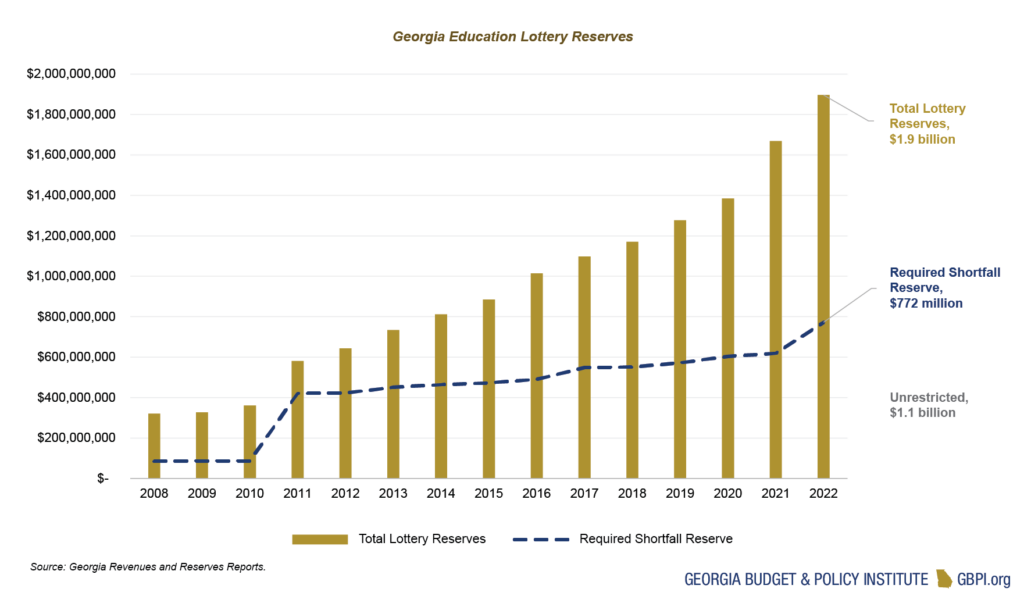Governor Brian Kemp’s proposed 2024 budget includes $1.4 billion for Georgia’s lottery-funded pre-Kindergarten (pre-K) and HOPE (Helping Outstanding Pupils Educationally) financial aid programs. About $1 billion is for HOPE, and $436 million is allotted for pre-K.
By the Numbers
Overall, the fiscal year 2024 budget for lottery-funded HOPE programs grew by $62 million. The proposed spending is set to increase HOPE scholarships and grants to cover 100% of tuition. Listed below is a list of lottery-funded program changes for the fiscal year 2024.
- University System of Georgia (USG): Increase funds to meet the projected need for the HOPE Scholarships program to cover 100 percent of tuition
- $58 million change
- Technical College System of Georgia (TCSG): Increase funds to meet the projected need for the HOPE Grants program to cover 100 percent of tuition and $3,227,686 to reduce out-of-pocket needs for students in commercial driver’s license and law enforcement programs at TCSG
- $3.2 million change
- Private Colleges in Georgia: Increase funds to meet the projected need for the HOPE Scholarship at private institutions
- $1.4 million change
Two lottery-funded programs, College Completion Grants and the HOPE high school equivalency exam, remained fiscally flat. College Completion Grants, which provide need-based financial aid to eligible students to complete remaining credential requirements, are constant at $10 million.
HOPE high school equivalency exam, which remains at $1.3 million, encourages Georgia’s High School Equivalency Exam recipients to pursue education beyond the high school level at an eligible postsecondary institution in Georgia. Proposed additions also include a $2,000 cost-of-living adjustment for full-time, benefit-eligible state employees, beginning in July 2023.
Pre-Kindergarten
Gov. Kemp’s proposed budget includes $35 million in additional lottery funding for a $2,000 Georgia Pre-K lead- and assistant-teacher pay raise, an increase in formula funds for classroom operations and a reduction in training and experience formula funds.[1]
HOPE Financial Aid Programs
HOPE is comprised of several different programs: HOPE and Zell Miller Scholarships, HOPE and Zell Miller Grants, HOPE Career Grants and HOPE General Educational Development (GED) Grants.
The HOPE Scholarship is for students seeking associate or bachelor’s degrees. The scholarship covers partial tuition for students with a 3.0 grade point average (GPA) in core academic courses. The Zell Miller Scholarship covers full tuition for students with a 3.7 high school GPA who score at least 1200 on the SAT or 26 on the ACT college admission exams, and take four rigorous courses (e.g., Advanced Placement or Dual Enrollment). Students must also maintain a 3.3 cumulative college GPA to keep the award.
The HOPE Career Grant is an award on top of the HOPE/Zell Miller Grant for students enrolled in certain certificate and diploma program areas identified as strategically important to the state’s economic growth.[2]
Georgia Student Finance Commission (GSFC) distributed $945 million in scholarships, grants and loans to more than 245,000 students in Georgia in 2022. Last year, GSFC reached a landmark, exceeding $13 billion in awards payments to over 2 million Georgians since the program’s inception in 1993.[3]
Lottery Reserves
Fiscal year 2022 appropriations deductions totaled $1.3 billion in the education lottery reserve. Total reserves now stand at $1.9 billion. About $772 million is required in case of a shortfall to be able to fund HOPE programs. An additional $1.1 billion are considered unrestricted reserves.[4]

Budget Recommendations
College affordability is an issue that many struggle to navigate. According to the National College Access Attainment Network (NCAN), only 24 percent of public four-year colleges/universities were affordable for Pell Grant recipients between 2019-2020. Data from NCAN also showed that the average affordability gap or unmet financial need at a four-year college institution was $2,627.[5]
Need-based financial aid is integral to students who experience barriers due to college affordability, and such aid is especially integral to Pell Grant recipients, who demonstrate financial need.
Just this year, Georgia lawmakers have worked to establish the College Completion grants program to help students “cross the finish line.” Currently, students at two-year and four-year colleges who have completed 80% of their coursework may qualify for college completion grant awards up to $2500 per student. Modeled after Georgia State University’s nationally recognized Panther Retention Grants program, completion grants provide students with micro-grant opportunities to substantially boost college graduation rates.[6]
College completion grants are a great start; however, need-based grants play a critical role in helping students gain access to higher education. Need-based support should start the very second that a student begins their college career, and there should be transparency in both college pricing and aid availability to help students steward their futures. Students who require financial assistance will benefit greatly from receiving support in the initial college-going phase as first-year students, and will also benefit from up-front, transparent pricing and user-friendly financial aid information.
With $1.1 billion in the unrestricted education lottery reserve, Georgia can better support students by extending financial aid assistance beyond completion grants, which are currently funded at $10 million.
Georgia can join sister states, like Florida and North Carolina, who have recognized that robust need-based aid is a wise investment.[7] In addition to the benefits mentioned, developing and funding a comprehensive need-based aid program would also mitigate poor mental health issues that students with low incomes face due to stress regarding college affordability.[8]
A state with a thriving workforce and strong economy needs skilled and educated workers. When lawmakers invest in students with low incomes, they also invest in Georgia as a whole. Equity-centered policymaking is a benefit to us all. We can begin by positioning our Georgia students for graduation with the financial resources they deserve to be successful.
End Notes
[1] Governor’s Office of Planning and Budget. (2023). AFY 2023 and FY 2024 governor’s budget report. https://opb.georgia.gov/document/governors-budget-reports/afy-2023-and-fy-2024-governors-budget-report/download.
[2] Georgia Student Finance Commission. (2023). Programs and regulations. https://gsfc.georgia.gov/programs-and-regulations.
[3] Georgia Student Finance Commission. (2024). Georgia student finance commission annual report. https://gsfc.georgia.gov/about-gsfc/annual-report-audited-statements.
[4] State Accounting Office. (2022). 2022 report of Georgia revenues and reserves. https://sao.georgia.gov/document/document/22grrr092322securedpdf–UNPUBLISHED-document–DO-NOT-SHARE-this-URL–/download.
[5] National College Attainment Network. (2020). The growing gap: Public higher education’s declining affordability for Pell Grant recipients. https://www.ncan.org/page/Affordability.
[6] Georgia State University. “Panther Retention Grants | Georgia State Student Success Initiatives.” Student Success Programs. https://success.gsu.edu/initiatives/panther-retention-grants/.
[7] Woodhouse, W. (2015, October 5). “States grow need-based aid.” Inside Higher Ed. https://www.insidehighered.com/news/2015/10/05/financial-need-aid-priority-most-states.
[8] Clarke, K. P. (2022, April 29). Mental health, cost concerns driving students away from higher ed, report shows. THE FEED. https://feed.georgetown.edu/access-affordability/mental-health-cost-concerns-driving-students-away-from-higher-ed-report-shows/.









